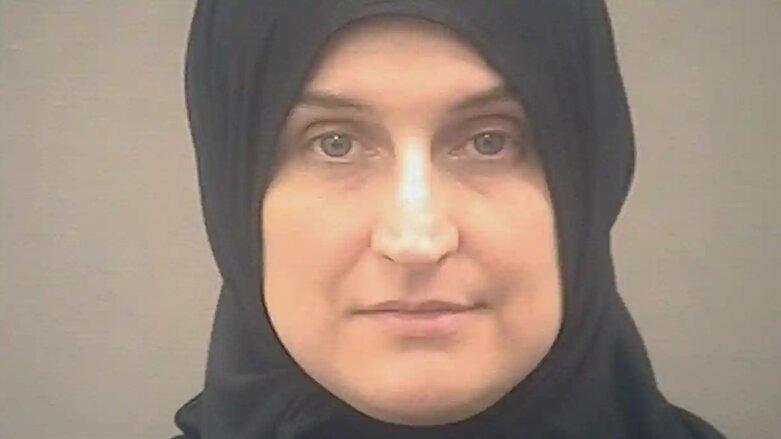US woman backed ISIS—'way for her to feel important'

WASHINGTON DC (Kurdistan 24) – A 42-year-old US citizen, Allison Fluke-Ekren, a convert to Islam, pled guilty on Tuesday to having provided material support to ISIS. Fluke-Ekren is scheduled to be sentenced in October. She faces up to 20 years in prison.
A former friend, who has known Fluke-Ekren for over 20 years, told The New York Times that supporting radical Islamic causes served a psychological purpose for her.
It "was a way for her to feel important," and "it made her have a sense of purpose," the Times reported.
Tuesday's court hearing took place in Alexandria, Virginia, just across the Potomac River from Washington DC. Since the 9/11 attacks, when Zacarias Moussaoui, a Moroccan who planned to be the 20th hijacker, was tried in that courthouse, individuals arrested abroad for terrorist offenses have regularly appeared in that courthouse. Indeed, Fluke-Ekren faced the same judge as Moussaoui did some two decades earlier, Leonie Brinkema.
As a youth, Fluke-Ekren lived in Topeka, the capital of the Midwestern state of Kansas. She seemed, many years ago, to be an ordinary, all-American girl.
Her father is a Vietnam veteran, while a teacher from the seventh and eighth grades in Topeka remembers Fluke-Ekren with fondness.
But something happened in the years since. She is estranged from her family—both her family in Kansas and her adult children—who want nothing to do with her.
A former friend, Amy Farouk, who first met Fluke-Ekren in 2001, described her as "a damaged person"—a teenage mother with two children, whose first marriage, in 2004, did not last very long, cut short by divorce.
Hence her embrace of a radical ideology, which gave her a cause and a sense of importance lacking in her life.
Turkish Husband and Support for Libya's Ansar al-Shariah
Fluke-Ekren's second husband was a Turk, Volkan Ekren. She, as well as Ekren, were students at the University of Kansas, where they both majored in the sciences.
Fluke-Ekren graduated in 2007 and became a science teacher. In 2008, she and Ekren, whom she married, moved to Egypt.
The "Arab Spring" began in 2011, and in Libya, NATO backed the uprising and the overthrow of Muammar al-Qaddafi's brutal regime. Ekren supported Ansar al-Sharia, a radical Islamic group, and moved with his family to Libya in 2011.
On Sept 11, 2012, Ansar al-Sharia attacked US facilities in Benghazi: the Consulate and a CIA Annex. The US ambassador, Chris Stevens, was killed in the assault.
Ekren took a box of documents and at least one electronic device from that compound, the Justice Department explained on Tuesday. Fluke-Ekren then helped review and summarize that material for the leadership of Ansar al-Sharia.
Late in 2012, as Ansar al-Sharia was increasingly suppressed in Libya, the family left for Syria, which itself had fallen into civil war.
Support for ISIS
After arriving in Syria, Fluke-Ekren left for Turkey, while Ekren remained there. In 2014, she rejoined him in Syria, and in 2015, they moved to Mosul, where they lived in an ISIS-controlled compound within the University of Mosul.
After Fluke-Ekren arrived in Mosul, the Justice Department said, "she met with ISIS personnel who were in charge of homes for widows" whose husbands had died fighting for ISIS. She helped ISIS "by providing ideas for how the homes should function and operate."
Her husband, for his part, became a senior figure overseeing ISIS's snipers. He was killed in an airstrike in 2016 on Tel Abyad.
Fluke-Ekren then married a Bangladeshi ISIS fighter known as Wamiq al-Bengali. Somewhat ominously, he worked on drones and developed a plan to use drones to disperse chemical weapons. But he also soon died.
Subsequently, Fluke-Ekren married another Bangladeshi, who also later died in the fighting.
In 2016, Fluke-Ekren "organized an effort to establish a Women's Center in Raqqa," the Justice Department said. The Center, supported by local ISIS authorities, provided medical services, childcare, and educational services about the terrorist group.
The Women's Center also provided military training, which formed the basis later that year for a unit of female fighters, although it is unclear if they ever saw any action.
Fluke-Ekren also spoke about ideas for carrying out major terrorist attacks on the US. One of her targets was a US college, and she claimed Abu Bakr al-Baghdadi, ISIS' nominal head, had agreed to fund her plot. However, she soon became pregnant, and the plot never materialized, nor did a subsequent idea of hers to bomb a US shopping mall.
Fluke-Ekren had a talent for languages, and she was fluent in Arabic, Turkish, and Spanish. Her greatest service to ISIS may well have been translating between the Middle Eastern languages and English.
Sobbing with Deep Regrets
Following the death of her fourth husband in 2018, Fluke-Ekren married yet again. But she was soon separated from her fifth spouse and surrendered to local police in Qabasin, Syria, as The New York Times reported. Subsequently, she was taken to a detention facility in Jarabulus.
"It is not clear, who ran the prison," the Times said, although it is likely to have been Turkey, given the facility's location in Syria, less than two kilometers from the Turkish border but west of the Euphrates River.
On Tuesday, standing before Judge Brinkema and entering her guilty plea, Fluke-Ekren finally seems to have come to a recognition of the mess that she has made of her life. As Brinkema mentioned her children, Fluke-Ekren cried.
